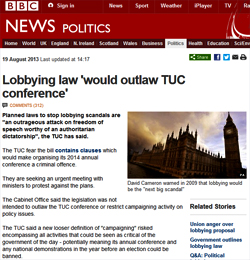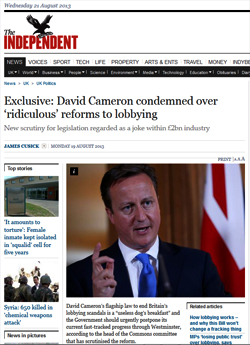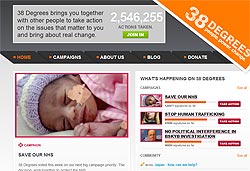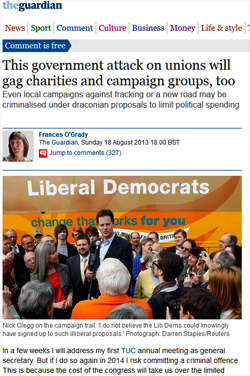In what started out as the Government claiming to wish to put transparency into party political lobbying groups, they have now produced a Bill which is an 'outrageous attack on freedom of speech worthy of an authoritarian dictatorship', according to both the TUC and other campaigning groups such as Hope Not Hate, 38 Degrees, Trade Unions AND even individuals!
Campaigning against/for any political party's policy whether it be concerning Fracking, Nuclear Weapons, Bus Passes, Pensions, Employment Rights, NHS Privatisation or Health & Safety At Work; within 12 months of a general election, will become illegal under the new Bill!
The TUC earlier this week said they are seeking an urgent meeting with Cabinet Office Minister Chloe Smith to protest at 'an outrageous attack on freedom of speech worthy of an authoritarian dictatorship' contained in clauses in the Transparency of Lobbying, non-Party Campaigning, and Trade Union Administration Bill.
The TUC is concerned that the Bill will make organising its 2014 annual Congress, or organising a TUC national demonstration in the 12 months before the 2015 General Election, criminal offences.
The provisions to regulate lobbying have also came under fire from the Chair of the Political and Constitutional Reform Committee chair Graham Allen MP on Monday of this week.
The background to this is that there have been several scandals involving lobbying, one of which led to the resignation of the then Defence Secretary Liam Fox; and led to both the Conservatives and Lib Dems pledging to act on lobbying in their 2010 coalition agreement after the prime minister described access for lobbyists in 2009 as the "next big political scandal" waiting to happen.
 However, as the BBC News website reports:
However, as the BBC News website reports:
“...... to the surprise of many at Westminster, the proposed new law contains restrictions on the campaigning activities of trade unions and other groups in the 12 months before a general election.”
This means that Trade Unions and its organisations lobbying against cuts to health and safety legislation, over the Government’s environmental policies, or against anything they actually bring into law during the 12 months immediately prior to the general election in May 2015; will be deemed illegal and the individuals concerned subjected to fines or prison!
Further, a Cabinet Office source quoted by the BBC also made it clear that the promotion and backing of a specific political party’s by charities and trade unions within 12 months of a forthcoming general election would also become illegal!
The BBC News website on Monday reported the Cabinet Office spokesperson as saying:
"The intention of the bill is to bring greater transparency where third parties campaign in a way which supports a particular political party or its candidates, by requiring expenditure on those campaigns to be fully recorded and disclosed.
This bill does not include campaigning by third parties - charities or other organisations - that are not intended to promote the electoral success of any particular party. So a third party campaigning only on policy issues would be exempt."
The Bill makes three changes to the regulation of campaigning by ALL non-party organisation in the 12 months before a general election. Breaching these will become a criminal offence.
The three changes are:
- Changing the definition of what counts as campaigning.
At present only activities designed with the intent of influencing an election result are regulated. The Bill will instead will regulate activity that may affect the result of an election. As any criticism of government policy could affect how people vote, this will severely limit any organisation's ability to criticise government policies in the run up to an election - not just unions, but charities, NGOs and local campaign groups too.
- Reducing the spending limit for third party campaigners to £390,000.
The amount that third party campaign groups can spend in the year before an election is reduced by more than half to £390,000.
- Including staff time and office costs in expenditure limits.
Presently only the costs of election directed materials and activities such as leaflets and advertisements are regulated. The Bill proposes that staff time and other costs should now be included in the limit.
As the costs of all organisations involved in an event are added together and this total counts against the limit for each group involved, the TUC's 2014 Congress, or a national demonstration, would not just take the TUC over the annual limit but each member union. While the TUC's Congress will be regulated, political party conferences are given an exemption in election spending limits.
This equally applies to all campaign groups organising public events, publicity campaigns and even sending out emails which campaign against Government policies and laws or to pressurise them into including new policies, changing policies or laws.
 Referring specifically to the affect upon Trade Unions and the TUC conference, TUC General Secretary Frances O'Grady said:
Referring specifically to the affect upon Trade Unions and the TUC conference, TUC General Secretary Frances O'Grady said:
“It's an open secret at Westminster that this rushed Bill has nothing to do with cleaning up lobbying or getting big money out of politics. Instead it is a crude and politically partisan attack on trade unions, particularly those who affiliate to the Labour Party.
But it has been drawn so widely that its chilling effect will be to shut down dissent for the year before an election. No organisation that criticises a government policy will be able to overdraw their limited ration of dissent without fearing a visit from the police.
Of course not everyone agrees with TUC views and policies, but I expect there to be wide revulsion at this attack on free speech worthy of an authoritarian dictatorship. This will not just gag unions, but any group or organisation that disagrees with government - or opposition - policies."
The Bill was published as Parliament broke up for the summer, and is to be debated as soon as MPs return with a second reading on 3 September. The Committee stage will take place on the floor of the House the week after - the same time as the TUC's 2013 Congress.
The government has broken pledges that the lobbying bill would be published in draft form and subject to pre-legislative scrutiny by a Select Committee. Even though the restrictions on third party campaigning make the Bill a constitutional measure, there has been no consultation process or cross-party talks.
The Independent newspaper had this to report with regard to the concerns being expressed about the Bill:
 “Graham Allen, who leads the Political and Constitutional Reform Select Committee, has taken the unusual step of recalling his committee ahead of MPs’ return to Parliament next month, to hold special evidence sessions involving leading figures from the UK lobbying industry.
“Graham Allen, who leads the Political and Constitutional Reform Select Committee, has taken the unusual step of recalling his committee ahead of MPs’ return to Parliament next month, to hold special evidence sessions involving leading figures from the UK lobbying industry.
“The new lobbying law is rushed and ridiculous,” said Mr Allen. He told The Independent: “Instead of addressing the Prime Minister’s promise to ‘shine the light of transparency’ on lobbying, this flawed legislation will mean we’ll all be back in a year facing another scandal. It is a dog’s breakfast.”
After years of scandal, the lobbying bill intended to address this is scheduled to receive its second reading on 2 September, with Downing Street confident it will then pass through the Lords and become law before the end of the year. It is hoped last-minute evidence from Mr Allen’s committee will force No 10 into a rethink by accepting that the legislation lacks credibility and is regarded as a bad joke inside the UK’s £2bn lobbying industry.
There is also anger among members of the reform committee that Chloe Smith, the Cabinet Officer minister piloting the lobbying law, ignored Commons convention and took over a year to respond to initial findings from MPs. Leading corporate affairs directors claim Ms Smith has barely spoken to anyone in the industry.
However, Mr Allen said: “Chloe Smith is a pawn in the firing line. The best way forward is to postpone and re-evaluate what is needed”.
It also reports Alexandra Runswick, director of the accountability pressure group, Unlock Democracy, as saying:
“To paraphrase the Prime Minister, this Bill is the next big scandal waiting to happen. We urge the Government to think again and bring forward more comprehensive proposals. There are gaping holes in this law. Business will simply be driven away from respectable lobbying companies into less reputable agencies.”
Tamasin Cave, director of Spinwatch, said:
“Firms will have to reveal less than they do voluntarily at the moment.”
Other leading figures from the UK’s top 20 corporate affairs firms privately told The Independent the industry had nothing to gain from flawed legislation.
One director said: “Everyone accepts the certain political outcome of this law failing to prevent yet another lobbying scandal – the Government will be forced to come back with something far more draconian.”
Campaigning Group Hope Not Hate which campaigns against racialism issued a press release saying:
“In the past only those organisations directly involved in engaging in the elections had to register as a Third Party with the Electoral Commission. Under these new proposals every organisation which seeks to influence public opinion, in the 12 months before the General Election – either directly or as a consequence of its actions – will now be covered. This will include charities, think tanks, trade associations and even blogs and websites.
The amount an organisation can spend is being drastically cut yet the scope of costs which have to be accounted for – such as staff time – has dramatically widened. Indeed, the restrictions on third parties are now far more extensive than those on political parties.”
 38 Degrees whose campaigns have been highly sucessful in focusing public attention upon political decisions which have impacted negatively on society, e.g. NHS Privatisation, Sales of the country's forests, Fracking, and HS2 to name jst a few; issued this press release:
38 Degrees whose campaigns have been highly sucessful in focusing public attention upon political decisions which have impacted negatively on society, e.g. NHS Privatisation, Sales of the country's forests, Fracking, and HS2 to name jst a few; issued this press release:
" The government’s rushing through a new law which, if it passes, will stop us running the type of campaigns which have made us who we are. The campaigns which have saved our forests, fought privatisation in the NHS, and defeated the snoopers' charter. The campaigns which have seen 1.7 million of us act together, locally and nationally, for over four years. In fact, if the new law passes, and we continue campaigning as we do now, the office team could even risk being sent to jail.
People power is at the heart of 38 Degrees. We don't spend too much, but our campaigns do cost money. Without being able to spend - employing staff, buying billboards, or printing leaflets about where politicians stand on local issues - we just won’t be able to make the issues which matter to us all, like the NHS and fair taxation, top of the agenda at the next election.
The three main political parties have a combined membership of around 433,000. There are 1.7 million of us. Per member, the parties would be able to spend over £130 - 38 Degrees would be able to spend around 23p. Put simply, this will make it hard to influence the next election, and every one after that."
But their final point is one which we all should take note of, specifically if we care about democracy:
"It's a really worrying time. The potential impact of this law is only just becoming clear. This threatens the entire way 1.7 million of us campaign together.
It’s not just us. Amazing people-powered campaigns like HOPE not hate's fight against the BNP in Barking and Dagenham, or Make Poverty History, just wouldn't be possible during election periods. Right when ordinary people should be able to have the most impact.
It's no exaggeration to say this law will make it easier for registered political parties like the BNP to campaign without challenge."
 The TUC provide an extract from the notes on clauses (detailed below), available
The TUC provide an extract from the notes on clauses (detailed below), available
here
The definition of the term "for electoral purposes" which is inserted into section 85(3) of PPERA by subsection (3) is cast in broad terms so as to capture all expenditure by a recognised third party that is incurred for the purpose of, or in connection with promoting or procuring the electoral success or enhancing the standing of a registered political party or parties or candidates.
The definition of "for election purposes" does not rely solely on the intent of the third party; the effect of the expenditure must also be considered. Any campaign expenditure which satisfies the definition outlined by new section 85(3) will be counted as controlled expenditure, regardless of whether those incurring the expenditure intended it (or also intended it) for another purpose.
Any expenditure on a matter set out in this list during the relevant period for an election will need to be accounted for as controlled expenditure. Thus, for example the full fees and costs in the 365 days before a UK general parliamentary election associated with any advertising, unsolicited material to electors, or manifestos, or with the organisation of any rallies or events, would count as controlled expenditure.
You can read an article against the Government's plans by Frances O'Grady in the Guardian newspaper here
Source: The Guardian / BBC News / The TUC / Hope Not Hate



 Referring specifically to the affect upon Trade Unions and the TUC conference, TUC General Secretary Frances O'Grady said:
Referring specifically to the affect upon Trade Unions and the TUC conference, TUC General Secretary Frances O'Grady said: 
 38 Degrees whose campaigns have been highly sucessful in focusing public attention upon political decisions which have impacted negatively on society, e.g. NHS Privatisation, Sales of the country's forests, Fracking, and HS2 to name jst a few; issued this press release:
38 Degrees whose campaigns have been highly sucessful in focusing public attention upon political decisions which have impacted negatively on society, e.g. NHS Privatisation, Sales of the country's forests, Fracking, and HS2 to name jst a few; issued this press release: